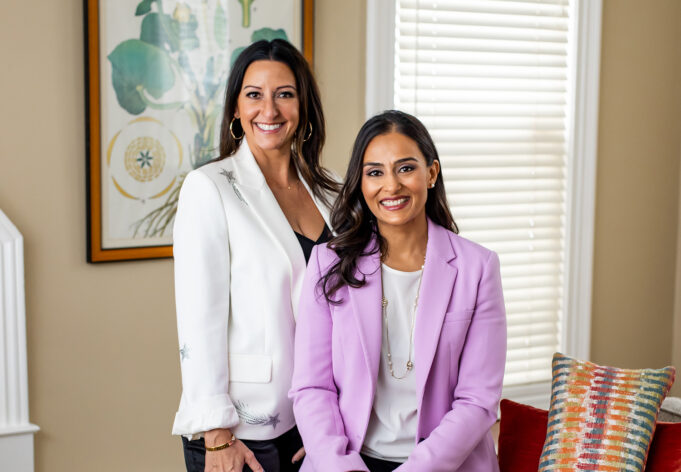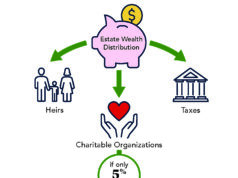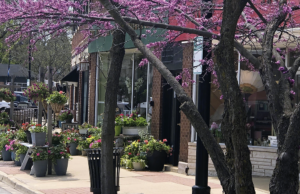Gina Pongetti Angeletti, MPT, and Arpi Thukral, MD, step up to co-chairs this year’s Walk for Wellness House
By Maureen Callahan
Each spring, the first Sunday in May sees the streets bordering the north side of Hinsdale Hospital transform into the route of the annual Walk for Wellness House (WH). People afflicted by cancer, their families, friends, and WH staff gather for a morning of companionship, light exercise, and fun. The act of walking is symbolic. Cancer is a journey on a route with many travelers. It’s a period of life marked by heavy burdens. But on walk day, the tone is light. It’s a day to celebrate, cheer for, interact with, and remember others on a similar path. Everyone here is in the same boat. All are affected by the same common denominator.
Survivors support those not as far along on the trek. Those currently in treatment reap wisdom from others with more experience. All have the opportunity to write messages and record memories on the Wall of Life. Little ones have fun with the children’s activities. New friends are made, and connections are solidified. Co-chairing this year’s walk is Physical Therapist, Gina Pongetti Angeletti, and Board-Certified Radiation Oncologist, Arpi Thukral. Each in their second of six-year terms as WH Board Members, they bring a clinical perspective to the group. Each has first-hand knowledge of the gravity of cancer, both professionally and personally. To meet them once is to understand their dedication to fighting the disease in ways respective to their individual disciplines. But while both work in heavily academic, science-based practices, they also realize the value in accompanying holistic treatments.

Both Gina and Arpi are committed to assisting patients dealing with the part-and-parcel aftermath of cancer’s destructive wake. Each promotes the ancillary benefits of WH to their patients. Said Gina, “Wellness House is an example of an institutional and cultural change in the way we treat cancer. We offer a way to incorporate all sides of cancer- the hard medical is already being addressed, and we balance the emotional, nutritional, spiritual, familial, and whole-body health that allows one to thrive.” Meet them on the following pages, then join them for the walk on Sunday, May 7. If circumstances of distance from Hinsdale make the walk impossible, participants can sign up to walk from a location of their choice! Choose between a 3K walk, 5K run- timed or untimed- or Walk Your Way, in which the course is up to you. Registrants will receive a long sleeve dri-fit Wellness Walk t-shirt. For information and to register, visit https://secure.qgiv.com/event/wfwh2023
All are welcome!
GINA PONGETTI ANGELETTI, MPT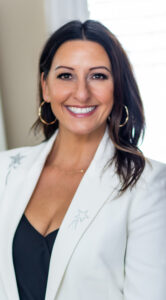
WHAT ATTRACTED YOU TO WH?
WH means a lot to me. My father passed from cancer a few years ago. Lauren Haarlow, the former WH president, was a patient and friend of mine. She told me about it when he was diagnosed. My parents and I all took part in WH programs, which helped tremendously in coping. One of my best friends and office manager, Craig Kruse, died last year of glioblastoma. To hit even closer to home, my husband worked his way through tonsil cancer last year. For each of these instances, we received much help from WH. Cancer affected our family, and learning how to navigate continuing through life, parenting, supporting your relationship, anxiety, and the unknown, and trying to keep life going for the kids was as much a need for us as the treatment itself. WH thinks of everything-every aspect of support and possible challenges- and offers a way to not only learn how to handle those things but to be surrounded by those traveling the same road.
WOULD YOU SHARE A LITTLE ABOUT YOUR PROFESSIONAL LIFE?
I have a Master of Physical Therapy, as well as a Bachelor of Communication from Marquette University. I also hold a Master of Public Health Communication from Michigan State University. I got interested in this discipline after being a gymnast for 14 years. I suffered two back fractures. At first, I thought I wanted to be a doctor, but then I realized the connection PT’s form with patients during rehab. The way in which my practitioners motivated me and the entire process of healing made me want to be a PT. But I wanted to be a different type of PT, with a focus on the psychology of the injury, but also the social impact of it. I wanted to be an agent of change, not only physically for people, but for their journey itself- mindset, impact on life, return to activities, and overall body health. It triggered something in me. Not just the physical nature of getting there but also the prevention and mind-body connection of helping the injured. It’s what we’re about at Achieve Orthopedic Rehab Institute.
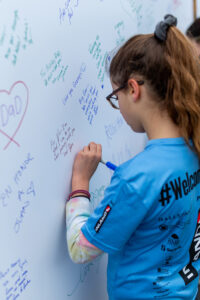
To me, it’s a gift to be able to open patients’ eyes to my process of rehab. It must be mind, body, spirit, physical and social. Those are the five tenants we work on with patients in my practice. In many practices, it’s very straightforward: a practitioner diagnoses, reads the MRI, discusses the injury, and presents the exercises.
Perhaps the patient feels stronger after that course of treatment, but what if that patient is afraid of re-entering the activity? My therapists work to help alleviate those fears for our patients. I have the privilege of treating world champions, Broadway actors, touring artists, and Olympians. Whether patients see us three times a week for months or through check-ins and for proactive health, they trust that not only my hands are involved on their journey of wellness. I appreciate their trust and do my very best to treat their whole being. My mindset of treatment closely aligns with the WH mission- thriving through life, not just surviving. Treating the person and the situation, not just the diagnosis. The fundraising that takes place during the Walk allows these services and this care to be offered to all that walk through the doors of WH.
 ARPI THUKRAL, MD MPH
ARPI THUKRAL, MD MPH
WHAT ATTRACTED YOU TO WH?
WH is a beautiful place of support for cancer patients and a cause that I strongly believe in. It’s close to my heart. As a practicing radiation oncologist, I see cancer every day, and I know that caring for my patients requires a multi-disciplinary approach. I have a strong interest in issues relating to the quality of life and supportive care for patients and their families as they undergo radiation therapy. In addition to myself and other doctors, cancer patients benefit from the care of a whole team, including nurses, social workers, psychologists, nutritionists, counselors, physical therapists, and many others. We’re all working to create the best possible outcome for our common patient. Part of that is looking for additional resources that patients and families can use. WH is a resource right here in our community that offers accompanying holistic treatments and psychosocial care for oncology patients and their families. The services provided complement the care we give in our local cancer centers. One of the greatest features is that all resources are free of charge for patients, survivors, and families. So, outside of the ongoing issues of living with cancer- or being in remission- patients have access to a wide array of services here, such as counseling and support groups, yoga, exercise, and nutrition classes, to name a few. When people are going through cancer treatment, medical bills run up quickly.
It’s an amazing thing to have a resource like this, that is completely donor-funded. WH is a place to which I often refer my patients. Sometimes, they’re not ready for it. They want to get through treatment first. I remind them at follow-up visits. I tell them about all the helpful resources for their spouses, children, or even their own parents or siblings. The organization has what it takes to get people through the emotional and physical burdens of cancer. It’s common for the outside world to fixate on the cancer being gone once treatment is finished. They sometimes forget about all that goes with it. Often, the anxiety of cancer takes a long time to dissipate. Navigating the challenges resulting from a cancer diagnosis and life after cancer treatment is what we call survivorship. It can be just as hard as getting through the actual medical treatment. I also appreciate WH on a personal level, having lost dear family members to cancer. I understand the fear, anxiety, and confusion that cancer brings to families. I have experienced it myself. I lost my uncle, who was like a second father to me, a few years ago. I also helped a very close cousin through hospice at the end of a long battle with breast cancer. She left behind an 11-year-old son, who watched his mother suffer through her last breaths. I wish both of my relatives and their families had had the resources available to them in their communities that WH provides.
WOULD YOU SHARE A LITTLE ABOUT YOUR PROFESSIONAL LIFE?
I am a board-certified radiation oncologist. I currently work at Northwestern Medicine Cancer Center and Proton Center in Warrenville. I’m a member of a large private practice group called Radiation Oncology Consultants. We serve many hospitals in the greater Chicago area. I treat all types of cancer, but my area of focus is breast and gynecological cancers. I graduated from the University of Michigan medical school. I also earned my Master of Public Health from there as well. During medical school, I spent a year working at the National Cancer Institute in Bethesda, MD. I was able to shadow doctors in radiation oncology. I was fascinated by this field and being able to blend the use of medicine and technology to minimize side effects while efficiently targeting tumors. When I returned to medical school the following year, I took some electives in radiation oncology. I knew it was the field for me! I completed my residency at the University of Pennsylvania, Philadelphia. After that, my husband and I moved to the area. I spent many years working at Good Samaritan Hospital’s Cancer Center, which was where I first became aware of WH. A few years ago, I moved to Northwestern Cancer Center in Warrenville, and I have been able to expand the scope of my practice to use proton radiation therapy and enroll patients in clinical trials in an academic setting.
I’m the first to admit that cancer is scary. People are going through a vulnerable time. Many don’t understand radiation very well at first and how it plays a role in their cancer care. The word itself is frightening. Sometimes, even convincing people to have treatment can be a challenge. Often, they have to get through denial, anger, and other emotions, as well. As their physician, I know this. I see the human side minus the scientific jargon. Being able to ease the fears of patients and guide them, as well as their families, through cancer treatment and life after is very meaningful to me. It is an art. The art of medicine and being able to provide this to families is what attracted me to being an oncologist. WH is a part of that. I’m glad to be able to direct my patients to ancillary coping mechanisms not necessarily found in hospitals.
“Navigating the challenges resulting from a cancer diagnosis and life after cancer treatment is what we call survivorship. It can be just as hard as getting through the actual medical treatment.”
There’s an understood idea that WH isn’t a club you would want to join. But it’s nice to know about it if there is ever a need. And for Gina, Arpi, and the incredible WH staff that go the extra mile, it’s truly their mission.
*Photos by Marcello Rodarte


